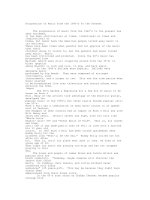Sequence of tenses when the main clause is in the past tense
Bạn đang xem bản rút gọn của tài liệu. Xem và tải ngay bản đầy đủ của tài liệu tại đây (10.75 KB, 1 trang )
Sequence of tenses: when the main clause is in the past tense
Sometimes the time expressed in the main clause is different from the time expressed in a subordinate clause.
This can confuse ESL students because they don’t know whether it is appropriate to use different tenses in the
different clauses of a sentence. Modal verbs also convey a sense of time. They can be confusing too. We hope
this lesson will be helpful to all students who are worried about using tense sequences correctly.
When the main clause is in the past tense
When the main clause is in the past or past perfect tense, the subordinate clause must be in the past or past
perfect tense.
He said that he wanted to go. (NOT He said that he wants to go.) (Here the main clause (He said) is in
the simple past tense and hence the subordinate clause, too, should be in the past tense.)
She said that she had paid the dues. (NOT She said that she has paid the dues.)
They asked me where I was going. (NOT They asked me where I am going.)
There are some exceptions to this rule. When the subordinate clause expresses a general truth, it can in the
present tense even when the main clause is in the past tense.
The teacher said that the earth moved around the sun. OR The teacher said that the earth moves around
the sun.
She said that she had cancer. OR She said that she has cancer. (The second sentence is possible as
long as the fact that she has cancer is true.)
Copernicus proved that the sun was the centre of the universe. OR Copernicus proved that the sun is
the centre of the universe.
Stay on top of your writing! Download our grammar guide from www.englishgrammar.org to stay up-to-date.
Powered by TCPDF (www.tcpdf.org)









